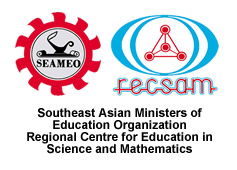Editorial Board (Issue 3 - 2008)
Dr Azian T.S. Abdullah (Advisor)
Devadason Robert Peter (Chief Editor)
Dr Cheah Ui Hock (Editor)
Dr Warabhorn Preechaporn (Editor)
Dr Wahyudi (Editor)
Ng Khar Thoe (Editor)
Contents
1. Use of the “X” Tool to Identify Region that Represents Given Inequalities (pp 1 – 14)
Theresa Lee Choon Moi
The “X” tool consists of an X marked on a piece of tracing paper. It is a simple tool that students can easily make and use to identify the region that satisfies two linear inequalities. An action research on the use of the tool has been carried out on a mixed ability group of 43 Form 5 students and it has been found to be effective in assisting students to determine the region that satisfies two linear inequalities.
2. Introduction to the Concept of Multiplication in Fractions (pp 15 – 21)
Alapa Stephen Ochefu
Experience has shown that the concept “Fraction” is abstract and difficult to conceive, especially among pupils/students who speak English as a second language. Fractions and any part of a whole are perceived as equal. As a result, further arithmetic operations on fraction are considered difficult. For instance, the result of multiplying two or more whole numbers produces a bigger number than any of the initial numbers used in the multiplication. This is in contrast with the results obtained when two or more fractions are multiplied and the result becomes smaller than any of the initial fractions. This paper attempts to use practical activities to justify the multiplication of fraction concept and explains a significant difference between fraction and an ordinary part of a whole.
Au Chui Kheng, Iis Ismayanti, Lai Lai Win,Wan Mah Binti Abdul Wahab, Wahyudi
This paper reports on the process of doing classroom action research as part of course requirement in a four weeks- course of action research done at SEAMEO RECSAM, Penang, Malaysia. We choose alternative assessment as our classroom action research topics as this become essential in teaching and learning processes yet was overlooked by teachers. We managed to conduct two cycles of action research and have experienced such hard processes yet meaningful learning journey. Reflections in teaching and on teaching were elaborated as well as reflections on our learning experiences during the conduct of classroom action research. Despite the limitation of the study, it was noted that we have gained a valuable experience in doing classroom action research.
Zainal Haji Ahmad, Huot Pealina, Sinnala Phonsanit, Tran Quoc Dung, Wahyudi
This paper reports on the process of doing classroom action research as part of course requirement in a four weeks- course of action research at SEAMEO RECSAM, Penang, Malaysia. We agreed to use Inquiry-Based Learning to enhance students’ understanding of the osmosis concepts. We were able to conduct two cycles of action research and have experienced such hard processes yet meaningful learning journey. Data were collected using various mean of instruments such as observation list, interview protocol, pre and post test, and questionnaire. Reflections in the teaching and on the teaching were elaborated as well as reflections on our learning experiences during the conduct of classroom action research. Despite the limitation of the study, it was noted that we have gained a valuable experience in doing classroom action research. Students’ misconception on the osmosis concept was also identified and tried to be rectified.

